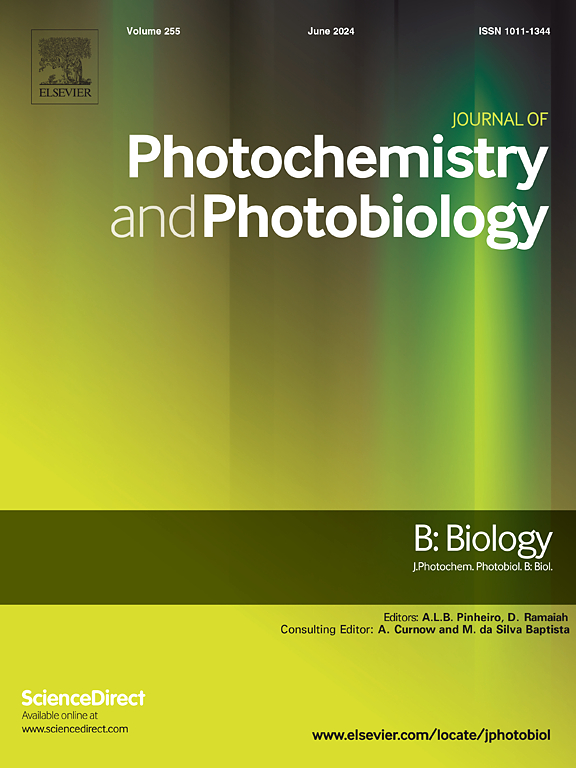Light and phytochrome PHY control the production of edible fungus Flammulina filiformis by regulating the morphogenesis of fruiting bodies and l-lysine accumulation
IF 3.9
2区 生物学
Q2 BIOCHEMISTRY & MOLECULAR BIOLOGY
Journal of photochemistry and photobiology. B, Biology
Pub Date : 2024-11-02
DOI:10.1016/j.jphotobiol.2024.113051
引用次数: 0
Abstract
Flammulina filiformis, a representative umbelliferous fungus, has a long stipe and high l-lysine content, thus is widely cultivated and consumed. Currently, there is a lack of theoretical guidance on how to better use light to cultivate edible fungi without photosynthesis such as F. filiformis in industrialized cultivation. Previous studies have found that blue light can affect the yield and l-lysine content of F. filiformis. The primary focus of this work was the phytochrome PHY in the light signaling pathway and its role in F. filiformis production. Unlike plants in which the expression of PHY was activated by only red light, it was found that different visible lights (including red, blue, green, and white light) can stimulate the up-regulation of FfPhy transcript levels. Throughout the developmental stages of F. filiformis, the transcript level of FfPhy was significantly up-regulated during the formation of fruiting body and in the stipe in the elongation stage. Further, FfPhy knockdown strain showed the markedly shorter stipe length than WT, resulting in a significantly reduced yield. RNA-Seq analysis showed that the most genes in MAPK signaling pathway and its downstream regulatory processes, mainly focusing on cell division and cell wall remodeling, were down-regulated after FfPhy knockdown. It suggested that FfPhy regulates the fruiting body elongation through acting on cell division and cell wall remodeling, thereby affecting the morphological development of the stipe rather than the pileus. Interestingly, FfPhy knockdown also inhibits the accumulation of l-lysine content by promoting l-lysine degradation instead of inhibiting l-lysine biosynthesis, indicating that its influence extends to metabolic processes related to l-lysine metabolism. These findings provide new insights into photobiological effect of FfPhy in macrofungus F. filiformis, and have potential guiding significance for cultivation and breeding to increase mushroom yield and l-lysine content.
光和植物色素 PHY 通过调控子实体的形态发生和赖氨酸的积累来控制食用菌丝状木耳的生产
丝状木耳(Flammulina filiformis)是伞形科真菌的代表,具有菌柄长、赖氨酸含量高等特点,因此被广泛栽培和食用。目前,在工业化栽培中,如何更好地利用光来栽培丝状木耳等无光合作用的食用菌还缺乏理论指导。之前的研究发现,蓝光会影响丝状真菌的产量和赖氨酸含量。这项工作的主要重点是光信号途径中的植物色素 PHY 及其在丝核菌生产中的作用。与仅红光能激活 PHY 表达的植物不同,研究发现不同的可见光(包括红光、蓝光、绿光和白光)都能刺激 FfPhy 转录本水平的上调。在丝核菌的整个发育阶段中,FfPhy的转录水平在子实体形成期和伸长期的柄部明显上调。此外,FfPhy基因敲除菌株的果柄长度明显短于WT菌株,导致产量明显降低。RNA-Seq分析表明,FfPhy敲除后,MAPK信号通路及其下游调控过程中的大部分基因下调,主要集中在细胞分裂和细胞壁重塑方面。这表明FfPhy通过作用于细胞分裂和细胞壁重塑来调控子实体的伸长,从而影响柄而不是绒毛的形态发育。有趣的是,FfPhy 基因敲除还能通过促进赖氨酸降解而不是抑制赖氨酸的生物合成来抑制赖氨酸含量的积累,这表明其影响延伸到了与赖氨酸代谢相关的代谢过程。这些发现为了解 FfPhy 在丝状真菌中的光生物效应提供了新的视角,对提高蘑菇产量和赖氨酸含量的栽培和育种具有潜在的指导意义。
本文章由计算机程序翻译,如有差异,请以英文原文为准。
求助全文
约1分钟内获得全文
求助全文
来源期刊
CiteScore
12.10
自引率
1.90%
发文量
161
审稿时长
37 days
期刊介绍:
The Journal of Photochemistry and Photobiology B: Biology provides a forum for the publication of papers relating to the various aspects of photobiology, as well as a means for communication in this multidisciplinary field.
The scope includes:
- Bioluminescence
- Chronobiology
- DNA repair
- Environmental photobiology
- Nanotechnology in photobiology
- Photocarcinogenesis
- Photochemistry of biomolecules
- Photodynamic therapy
- Photomedicine
- Photomorphogenesis
- Photomovement
- Photoreception
- Photosensitization
- Photosynthesis
- Phototechnology
- Spectroscopy of biological systems
- UV and visible radiation effects and vision.

 求助内容:
求助内容: 应助结果提醒方式:
应助结果提醒方式:


